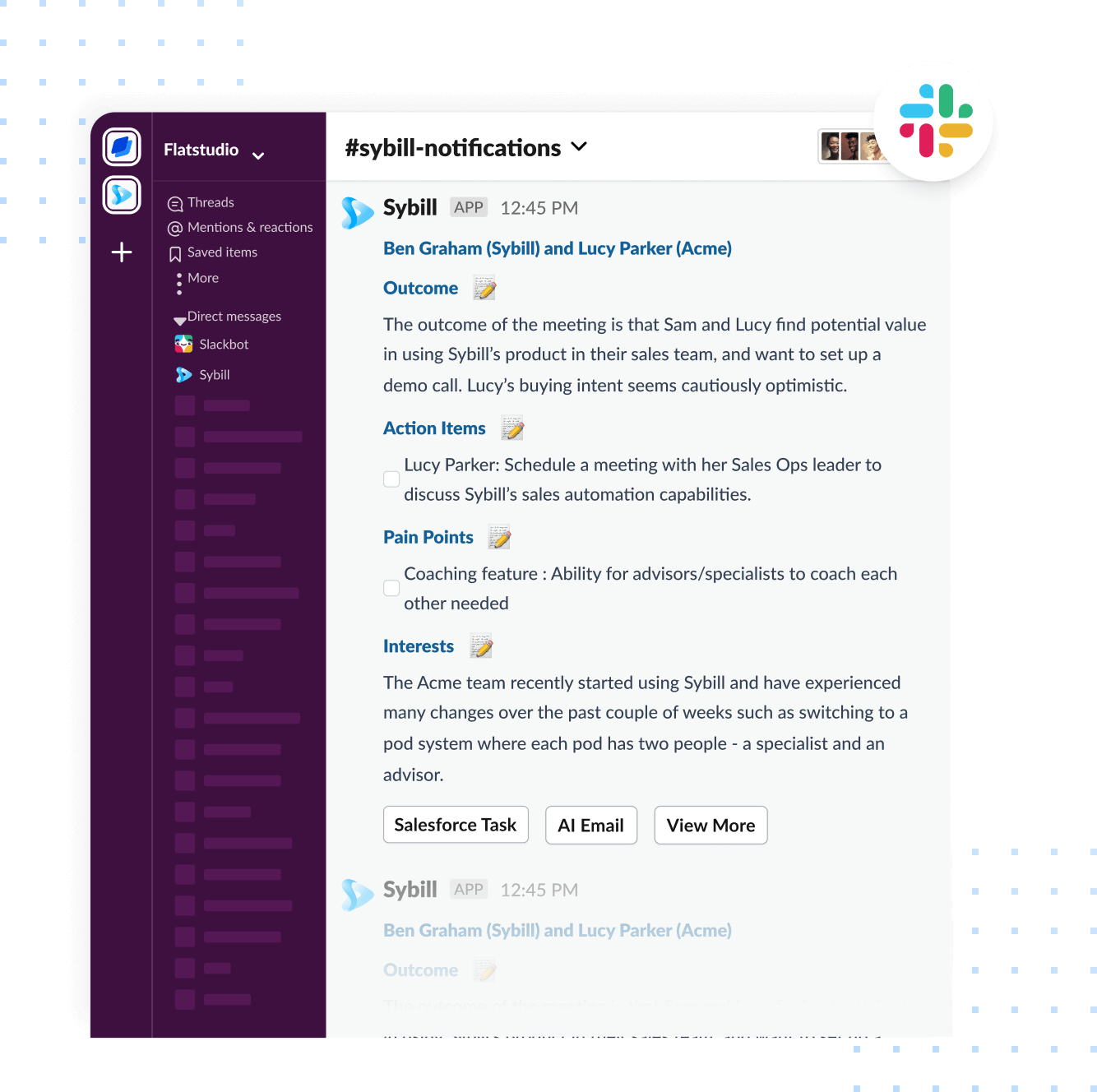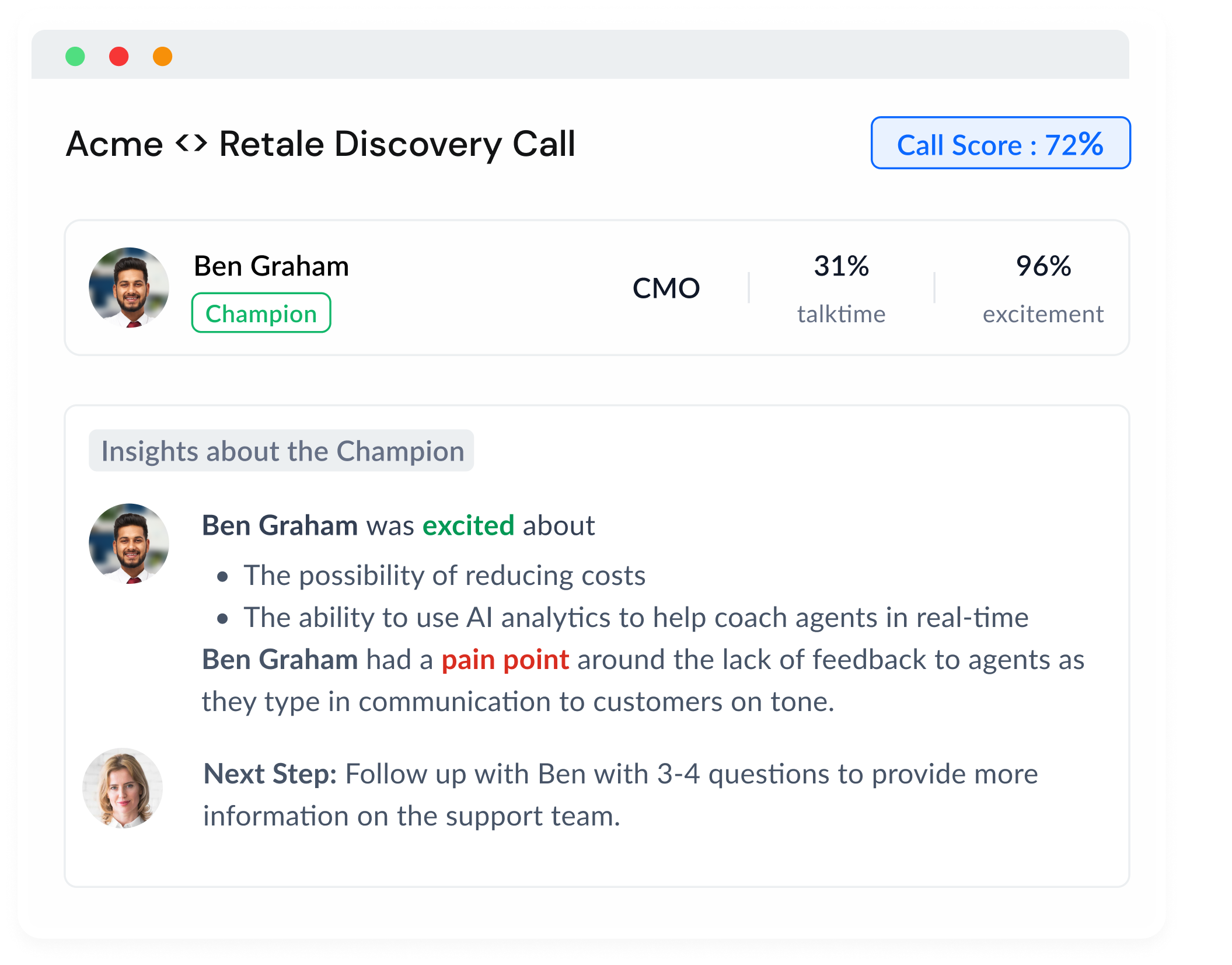Markets have slowed down.
Net new revenue is hard.
Generative AI is picking up and everyone and their mother is releasing an AI call summarizer solution.
Yes, we have one as well. And yes, we’ve tested what’s out there in the market.
In this comparative post, we go over the popular AI summarization tools, what they have to offer, and how they differ from each other. In a market that’s drastically different from 2021 and every revenue leader is expected to accomplish more from less resources, a call summarization solution that actually helps your team save time and follow-up effectively could be a boon.
At the same time, there are plenty of tools that offer call summarizers which are not much different from being a thin wrapper on top of ChatGPT. This almost never leads to a robust and accurate summarizer that works consistently across calls.
But why invest into such automation and AI? Is it all just hype?
Generative AI, catapulted into cult status in 2023 by OpenAI and others, does have substantial value to offer beyond the hype. And right now, it’s the lowest hanging fruit for revenue leaders looking to:
- Increase the number of opportunities that their team is working on
- AND increase their team’s win rates
- AND hit their mark even with a smaller team
I am not the only one saying this. HBR finds that over a third of sales activities benefit from automation when implemented correctly. AI sits at the forefront of automation in 2023. And well beyond.
These nifty AI tools are helping sales teams across the board take care of monotonous tasks like call summaries, CRM updates, and follow-up emails, so they can collectively focus on building relationships, customizing their approaches for every individual buyer, and sealing the deal.
I recently wrote all about AI summarizers and we’re here today to deep dive into AI summarizers for sales workstreams. Let’s check out all the new Generative AI-led developments happening in the world of sales and summarization and how the latest summarization features in AI sales enablement tools stack up against each other.
But First, Why Use AI Summarizers for Sales
Using AI summarizers for sales is like having your own personal Dwight Schrute from "The Office" – tirelessly dedicated to taking care of all the mundane tasks, like CRM updates, that you'd rather avoid.
Firstly, they automate the tedious process of taking and analyzing meeting notes, saving valuable time that can be better spent on prospecting and nurturing leads. By providing concise and accurate summaries of calls, AI-powered tools allow sales professionals to focus on the most important points and prioritize the right follow-up actions.
Secondly, AI summarizers can identify trends and patterns in communication, enabling sales teams to refine their techniques and strategies. These insights help salespeople adapt their approach to cater to individual prospects, increasing the likelihood of successful deal closures.
Thirdly, many AI summarizers often integrate with CRM platforms, ensuring seamless data sharing and reducing manual work for sales reps. This integration enhances collaboration within the sales team, allowing them to stay up-to-date on the latest developments and coordinate their efforts more effectively.
TL;DR: Why use AI summarizers for sales
- Automates mundane tasks, freeing up time for relationship building and actual selling
- Saves valuable time by handling note-taking and analysis
- Helps you write the best-suited follow-up emails for each call, making sure you incorporate the specific interests and pain-points of the prospects
- Identifies communication trends and patterns for strategy refinement
- Seamlessly integrates with CRM platforms for improved insight sharing and collaboration
Battle of AI Summarizers for Sales: The Proof is in the Pudding
Here’s the TL;DR comparison of AI summarizers for sales.
1. Sybill: Accuracy is the Superpower
Sybill was the first to launch sales call summarization, and we took the liberty to call it the Magic Summary. Because hey, Sybill was a magic teacher in the Harry Potter series, and the quality and the human-ness of the summaries were nothing less than magic even to our team with 20+ years of cumulative experience in AI and machine learning. Since then, Sybill has continuously evolved its summaries, making them come alive with the highest accuracy in all sorts of sales, customer success, support and other customer-facing conversations.
Sybill’s magic summary has a structure that was honed over experiments with 100s of sales pros. It starts with the call outcome that captures the nature of the call, covers what was discussed, major areas of contest, and the end result. It also calls out the perceived buying intent for sales conversations based on Sybill’s AI’s judgment after seeing tens of thousands of calls. Next come the individual action items, with the highest degree of precision and recall. This is followed by each prospect’s individual interests and pain points captured by Sybill. The magic summary even captures small talk and conversation starters - stuff that’s typically never a part of the CRM notes, but helps build rapport in future conversations more often than a seasoned seller can count.
Sybill’s summaries are a product of not just processing and understanding the transcript, but also take into account the non-verbal reactions of the participants (for subscribers of the Mind Raeder plan). No other tool focuses on the non-verbal behaviors and deciphering a prospect's mental state from them, and that puts Sybill’s summaries in a different league. All because it allows sales pros to focus on active listening and empathy: skills that keep getting more important as the sales landscape changes and gets more competitive.
Sybill automatically pushes the summaries in your favorite CRM systems after each call, matching them with the right opportunity, contact and company. In addition, Sybill can push call summaries, action items and next steps directly to Slack and email, keeping not just you and your prospect but also your manager and team in the loop.
Sybill also writes a follow-up email for you based on the call summary. Most typical users just tweak the follow-up email a bit and hit send, saving hours every week in note-taking and follow-ups. A typical 15-20 minute stretch of writing a follow-up email from scratch is transformed into a 2-3 minute editing session with Sybill’s AI-generated follow-up email to serve as a pretty damn good starting point.
The last key differentiator for Sybill is that it integrates with Gong and Chorus as well - so if you already use those platforms for call recordings and conversation intelligence, Sybill can plug into them and be your AI sales assistant, producing summaries, entering call notes into your CRM, and generating follow-up emails for you.
Sybill’s Magic Summary: All the context sales pros and sales leaders need to close more deals, delivered on Slack, email and CRM.
Sybill stands out in the crowded world of AI summarization tools because of its high accuracy and relevance to sales conversations. According to testimonials by many users, Sybill’s summaries have over 95% perceived accuracy, and have beaten all the other tools in this list head-to-head in human rating of accuracy in their own experiments.
There are some downsides to Sybill, of course. While it excels in emotional intelligence and produces absurdly human next steps, summaries and follow up emails, it is yet to offer custom summarization for different roles. The operative word? Yet.
We’re constantly working with our users to understand their real world needs and build features that speak to those needs.
Pros:
- Comprehensive call summaries that consider both verbal and non-verbal aspects of sales calls and prospect behaviors
- Streamlined CRM, Slack and email integration for improved transparency and collaboration
- Helps leaders with more accurate sales forecasting with granular context on every deal
- Time-saving follow-up email generation
- Compatibility with Gong and Chorus for extended capabilities
- The most accurate AI summaries in the market, with an open free trial for anyone to try it out.
- 14-day free trial
Cons:
- Currently lacks role-based summarization.
- Doesn’t support all sales methodologies yet (to be launched in end of Q3 2023).
2. Avoma: The All-Around Meeting Assistant
Avoma distinguishes itself as an end-to-end meeting assistant that records, transcribes, summarizes, and shares your meetings, claiming that it is more than just a conversational intelligence tool. It offers automated call summaries, pre-defined structures, CRM push integration, and even dialer input, which helps streamline workflows and promote better collaboration by automatically summarizing and sharing meeting notes with your team.
A flip side with Avoma is that you can only get Avoma’s summaries if you’re using the tool to record calls as well, which is ill-suited for those who are using Gong, Chorus or other tools for call recording. Avoma also doesn’t focus on emotional cues to figure out prospect interest points, and its integration with salespeople’s current workflow could do more - there’s no Slack integration for call summaries.
Avoma hasn’t ventured into generating follow-up emails as well, which still leaves quite a bit to be done on the seller’s side post-call. This could make it less suitable for sales professionals who are looking for a more holistic sales assistant that can automate both notes, CRM entry and follow-ups.
Avoma does succeed in putting together a summarization platform that their users can customize based on their needs, which is definitely a plus.
The summaries do leave quite a bit to be desired when it comes to their accuracy and usability - based on experiments done by our users (both those who pay for Sybill as well those who pay for Avoma), being accurate as a summarizer is not their strong suit.
Pros:
- Comprehensive meeting assistance, including recording, transcribing, and summarizing
- Pre-defined structures and CRM integration streamline workflows
- Promotes better collaboration by automatically sharing meeting notes with the team
- Allows for customization of the summaries
Cons:
- Requires using Avoma for call recording, which is not ideal for users of other conversation intelligence products like Gong or Chorus.
- Does not focus on emotional cues for understanding prospect interest points
- Limited workflow integration, with no Slack support for call summaries
- Does not generate follow-up emails, leaving more work for sales professionals post-call
- Not the most accurate or nuanced in its understanding of sales conversations, leading to a general skepticism in trust while using it.
3. Momentum: Deep Integrations and Workflow Automation
Momentum recently came up with Momentum AI, which is in addition to their core suite of features including custom deal rooms. It is an AI summarization tool that emphasizes methodologies to help sales professionals drive their sales processes more effectively. With automated call summaries, CRM push integration, and pre-defined structures, Momentum allows sales teams to stay on top of their deals and maintain a more organized sales process.
One of the advantages of using Momentum is its focus on methodologies, which provides sales professionals with guidance on best practices and processes to follow for successful sales outcomes. This can be particularly helpful for teams that need more structure and direction in their sales approach.
However, there are several features that Momentum lacks compared to some of the other tools on this list. It does not offer emotional intelligence-based summaries, dialer input or a coherent structure in its summaries. These missing features could make Momentum less appealing to sales professionals who require a more comprehensive set of capabilities from their AI summarization tool, as well as those that value usability and accuracy over being integrations-rich.
Pros:
- Emphasizes sales methodologies for more effective sales processes
- Has a chat interface for each call
- Helps sales teams stay organized and on top of their deals
- Provides guidance on best practices for successful sales outcomes
Cons:
- Does not offer emotional intelligence-based summaries for deeper insights
- Does not emphasize a structure in its call summaries
- May be less appealing to sales professionals seeking a comprehensive AI summarization tool, or one that focuses on making its summaries more structured, accurate and usable beyond just updating the CRM.
4. Winn AI: Show and Tell
Winn is an AI summarization tool that records updates to Salesforce fields in real-time and generates call summaries as well. Winn has a sharp focus on CRM updates, and support sales methodology-based updates like MEDDICC from the get-go.
In addition to its user-defined structure capabilities, Winn also focuses on methodologies, providing guidance on best practices for successful sales outcomes. This can be particularly beneficial for teams that need more direction and structure in their sales approach.
However, based on experience from actual Winn users, it seems that while Winn definitely competes on feature-parity and a knack for marketing, the product maturity is pretty low. The call summaries and CRM updates are not the best-in-class and miss nuance, leading to relatively lower accuracy levels. The battle for the throne of the best call summarizer and assistant is still fresh, and it remains to be seen how Winn takes it forward in their product.
Pros:
- Allows sales professionals to define their own structure for call summaries
- Focuses on methodologies like MEDDICC, providing guidance on best practices for sales success
- Offers more control over the information received, catering to personal preferences and needs
Cons:
- Does not offer emotional intelligence-based summaries for deeper insights
- A relatively nascent integrations ecosystem that might hamper cross-company visibility, collaboration and ease-of-use
- Low accuracy in summaries and CRM updates based on experiments
- May be less suitable for sales professionals seeking a comprehensive AI summarization tool
5. Attention: The AI Chat Companion
Attention offers a unique chat interface for sales professionals, making it a more interactive and engaging AI summarization tool. It provides automated call summaries, pre-defined structures, CRM push integration, and even AI-generated follow-up emails, streamlining workflows and improving collaboration.
The chat interface makes Attention stand out from the other tools on this list, allowing sales professionals to interact with their AI assistant in a more conversational manner. This can lead to a more enjoyable and efficient user experience.
However, Attention has its limitations. It does not offer emotional intelligence-based summaries, user-defined structures, methodologies, or Slack push integration. These missing features might make Attention less appealing to sales professionals who require more than just a chatbot over calls.
Based on experiments by users, it seems that their summaries leave quite a bit wanting in terms of accuracy and a usable structure.
Pros:
- Unique chat interface
- AI-generated follow-up emails
- Automated CRM updates
Cons:
- Does not offer emotional intelligence-based summaries for deeper insights
- Low accuracy in summaries
- Lacks user-defined structures and methodologies for a more tailored sales approach
- No Slack push integration for seamless collaboration with teams
6. Fathom: The Free Tool Extends its Wings
Fathom focuses on providing sales professionals with a comprehensive CRM integration, offering automated call summaries, pre-defined structures, and a seamless push to the CRM. This focus on CRM integration makes it easier for sales teams to keep track of their deals and maintain an organized sales process, reducing much of the manual data entry that teams with heavy CRM-reliance have to deal with.
However, Fathom lacks some foundational features that other AI summarizers for sales on this list provide, such as emotional intelligence-based summaries, AI-generated follow-up emails, user-defined structures, methodologies, chat interfaces, and Slack push integration. Fathom’s summaries are also less accurate than most tools, and don’t have a good structure to organize them - and they end up being just a bullet point list with no sense of what’s more important than others, and what one needs to look at first for a quick recap. The lack of structure and low accuracy make their summaries just a checkmark, but not a game-changer, as call summaries should be, missing the mark on saving reps actual time while following up and filling in their managers on calls.
These missing features may make Fathom less suitable for sale pros looking for AI summarizers that do more than just data entry.
Pros:
- Reduces manual data entry for teams heavily reliant on CRM
- Low cost
Cons:
- Does not offer emotional intelligence-based summaries for deeper insights
- Lacks AI-generated follow-up emails, user-defined structures, and methodologies for a more tailored sales approach
- No chat interfaces or Slack push integration, so no improvement in collaboration workflows
- No proper structure for summaries, and low accuracy in summaries.
7. Supernormal: Chrome Extension FTW!
Supernormal offers a well-rounded AI summarization experience, providing automated call summaries for all types of calls. It has a free version that works as a Chrome extension, and a paid one that takes other call providers like Zoom and MS Teams in as well.
However, Supernormal does have limitations. It does not offer emotional intelligence-based summaries, AI-generated follow-up emails, user-defined structures, methodologies, or chat interfaces. Supernormal is also meant as an all-encompassing summarization tool, and as such its structure is not tailored towards sales teams, and neither are its models, which often misinterpret the call intent and outcome. It doesn’t have deep CRM or Slack integrations, and playing with other software is minimal.
So the time saving is not as consequential as one would expect when working with an AI sales summarizer, though its low cost and ubiquity make it a great starting point for the dilettante.
Pros:
- Chrome extension for Google Meet, allowing for seamless usage.
- Low cost, meant for usage for all internal and external meetings
Cons:
- Does not offer emotional intelligence-based summaries for deeper insights
- Lacks AI-generated follow-up emails for a more efficient follow-up process
- No user-defined structures, methodologies, or chat interfaces for a tailored sales approach and enhanced user experience
- A generic summarizer that doesn’t understand nuance in sales calls
- Lack of an integrations ecosystem
8. Clari Copilot (Wingman): RevGPT
Offering automated call summaries, pre-defined structures, and CRM push integration, Wingman streamlines workflows and keeps your team on the same page.
Wingman was recently rebranded as the Clari Copilot, where the acquirers have made their intentions clear that it’s another card in their game of owning the entire revenue stack. While Wingman starts off well with automated call summaries and action items, it falls short because it just ends there. It doesn’t go deeper into prospect pain, interests, small talk, decision criteria, or anything of the sort, thus limiting the amount of impact it can have on deal progression and time savings. i
it integrates with Slack to deliver call summaries, next steps, and suggested actions in a conversational format, which makes digesting information and taking action more intuitive.
However, there are many features that Wingman RevGPT lacks compared to other tools on this list. It doesn't offer emotional intelligence-based summaries, user-defined structures, methodologies, chat interfaces, dialer input, or AI-generated follow-up emails. These missing features could make Wingman RevGPT less appealing to sales professionals who are looking for a more comprehensive, left & right brained personalization with AI summarization for sales.
Pros:
- Slack and CRM integrations
- Clari’s brand
- Delivers call summaries, next steps, and suggested actions in a conversational format
Cons:
- No emotional intelligence-based summaries for deeper understanding of prospect emotions and responses to pitches and demos
- Incomplete call summaries and low bar on accuracy
- Lacks user-defined structures and methodologies for tailored sales strategies
- No chat interfaces, dialer input, or AI-generated follow-up emails for a comprehensive sales AI experience
Best AI Summarizers for Sales Pros: Still Unsure Which One’s the Best for You?
We have you covered!
Try a 14-day free trial of Sybill. Sign up here.
Our users have tested out each of the tools in this post, and you’re welcome to pit them head-to-head against each other and see for yourself what stands out to you. There’s a lot of noise around AI-powered sales tools right now, which makes it all the more important for you to take a skeptical eye and examine them individually to see what fits the bill for you.
Separate the wheat from the chaff, as they say ;)















.png)





